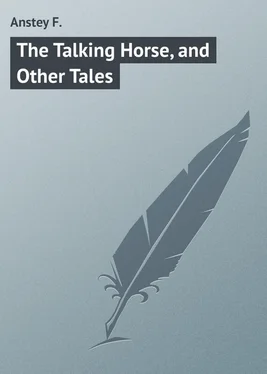F. Anstey - The Talking Horse, and Other Tales
Здесь есть возможность читать онлайн «F. Anstey - The Talking Horse, and Other Tales» — ознакомительный отрывок электронной книги совершенно бесплатно, а после прочтения отрывка купить полную версию. В некоторых случаях можно слушать аудио, скачать через торрент в формате fb2 и присутствует краткое содержание. Жанр: foreign_prose, foreign_language, на английском языке. Описание произведения, (предисловие) а так же отзывы посетителей доступны на портале библиотеки ЛибКат.
- Название:The Talking Horse, and Other Tales
- Автор:
- Жанр:
- Год:неизвестен
- ISBN:нет данных
- Рейтинг книги:4 / 5. Голосов: 1
-
Избранное:Добавить в избранное
- Отзывы:
-
Ваша оценка:
- 80
- 1
- 2
- 3
- 4
- 5
The Talking Horse, and Other Tales: краткое содержание, описание и аннотация
Предлагаем к чтению аннотацию, описание, краткое содержание или предисловие (зависит от того, что написал сам автор книги «The Talking Horse, and Other Tales»). Если вы не нашли необходимую информацию о книге — напишите в комментариях, мы постараемся отыскать её.
The Talking Horse, and Other Tales — читать онлайн ознакомительный отрывок
Ниже представлен текст книги, разбитый по страницам. Система сохранения места последней прочитанной страницы, позволяет с удобством читать онлайн бесплатно книгу «The Talking Horse, and Other Tales», без необходимости каждый раз заново искать на чём Вы остановились. Поставьте закладку, и сможете в любой момент перейти на страницу, на которой закончили чтение.
Интервал:
Закладка:
'I intend to begin now ,' I said. 'Monster, demon, whatever you are that have held me in thrall so long, I have broken my chains! I have been a coward long enough. You may kill me if you like. I rather hope you will; but first I mean to pay you back some of the humiliation with which you have loaded me. I intend to thrash you as long as I remain in the saddle.'
I have been told by eye-witnesses that the chastisement was of brief duration, but while it lasted, I flatter myself, it was severe. I laid into him with a stout whip, of whose effectiveness I had assured myself by experiments upon my own legs. I dug my borrowed spurs into his flanks. I jerked his mouth. I dare say he was almost as much surprised as pained. But he was pained!
I was about to continue my practical rebuke, when my victim suddenly evaded my grasp; and for one vivid second I seemed to be gazing upon a birdseye view of his back; and then there was a crash, and I lay, buzzing like a bee, in an iridescent fog, and each colour meant a different pain, and they faded at last into darkness, and I remember no more.
'It was weeks,' concluded Mr. Pulvertoft, 'before that darkness lifted and revealed me to myself as a strapped and bandaged invalid. But – and this is perhaps the most curious part of my narrative – almost the first sounds that reached my ears were those of wedding bells; and I knew, without requiring to be told, that they were ringing for Diana's marriage with the Colonel. That showed there wasn't much the matter with me, didn't it? Why, I can hear them everywhere now. I don't think she ought to have had them rung at Sandown though: it was just a little ostentatious, so long after the ceremony; don't you think so?'
'Yes – yes,' I said; 'but you never told me what became of the horse.'
'Ah! the horse – yes. I am looking for him. I'm not so angry with him as I was, and I don't like to ask too many questions at the stables, for fear they may tell me one day that they had to shoot him while I was so ill. You knew I was ill, I dare say?' he broke off: 'there were bulletins about me in the papers. Look here.'
He handed me a cutting on which I read:
'The Recent Accident in Rotten Row. – There is no change as yet in Mr. Pulvertoft's condition. The unfortunate gentleman is still lying unconscious at his rooms in Park Street; and his medical attendants fear that, even if he recovers his physical strength, the brain will be permanently injured.'
'But that was all nonsense!' said Mr. Pulvertoft, with a little nervous laugh, 'it wasn't injured a bit, or how could I remember everything so clearly as I do, you know?'
And this was an argument that was, of course, unanswerable.
THE GOOD LITTLE GIRL
A STORY FOR CHILDREN
Her name was Priscilla Prodgers, and she was a very good little girl indeed. So good was she, in fact, that she could not help being aware of it herself, and that is a stage to which very many quite excellent persons never succeed in attaining. She was only just a child, it is true, but she had read a great many beautiful story-books, and so she knew what a powerful reforming influence a childish and innocent remark, or a youthful example, or a happy combination of both, can exert over grown-up people. And early in life – she was but eleven at the date of this history – early in life she had seen clearly that her mission was to reform her family and relatives generally. This was a heavy task for one so young, particularly in Priscilla's case, for, besides a father, mother, brother, and sister, in whom she could not but discern many and serious failings, she possessed an aunt who was addicted to insincerity, two female cousins whose selfishness and unamiability were painful to witness, and a male cousin who talked slang and was so worldly that he habitually went about in yellow boots! Nevertheless Priscilla did not flinch, although, for some reason, her earnest and unremitting efforts had hitherto failed to produce any deep impression. At times she thought this was owing to the fact that she tried to reform all her family together, and that her best plan would be to take each one separately, and devote her whole energies to improving that person alone. But then she never could make up her mind which member of the family to begin with. It is small wonder that she often felt a little disheartened, but even that was a cheering symptom, for in the books it is generally just when the little heroine becomes most discouraged that the seemingly impenitent relative exhibits the first sign of softening.
So Priscilla persevered: sometimes with merely a shocked glance of disapproval, which she had practised before the looking-glass until she could do it perfectly; sometimes with some tender, tactful little hint. 'Don't you think, dear papa,' she would say softly, on a Sunday morning, 'don't you think you could write your newspaper article on some other day – is it a work of real necessity?' Or she would ask her mother, who was certainly fond of wearing pretty things. 'How much bread for poor starving people would the price of your new bonnet buy, mother? I should so like to work it out on my little slate!'
Then she would remind her brother Alick that it would be so much better if, instead of wasting his time in playing with silly little tin soldiers, he would try to learn as much as he could before he was sent to school; while she was never tired of quoting to her sister Betty the line, 'Be good, sweet maid, and let who will be clever!' which Betty, quite unjustly, interpreted to mean that Priscilla thought but poorly of her sister's intellectual capacity. Once when, as a great treat, the children were allowed to read 'Ivanhoe' aloud, Priscilla declined to participate until she had conscientiously read up the whole Norman period in her English history; and on another occasion she cried bitterly on hearing that her mother had arranged for them to learn dancing, and even endured bread and water for an entire day rather than consent to acquire an accomplishment which she feared, from what she had read, would prove a snare. On the second day – well, there was roast beef and Yorkshire pudding for dinner, and Priscilla yielded; but she made the resolution – and kept it too – that, if she went to the dancing class, she would firmly refuse to take the slightest pains to learn a single step.
I only mention all these traits to show that Priscilla really was an unusually good child, which makes it the more sad and strange that her family should have profited so little by her example. She was neither loved nor respected as she ought to have been, I am grieved to say. Her papa, when he was not angry, made the cruellest fun of her mild reproofs; her mother continued to spend money on dresses and bonnets, and even allowed the maid to say that her mistress was 'not at home,' when she was merely unwilling to receive visitors. Alick and Betty, too, only grew more exasperated when Priscilla urged them to keep their tempers, and altogether she could not help feeling how wasted and thrown away she was in such a circle.
But she never quite lost heart; her papa was a literary man and wrote tales, some of which she feared were not as true as they affected to be, while he invariably neglected to insert a moral in any of them; frequently she dropped little remarks before him with apparent carelessness, in the hope that he might put them in print – but he never did; she never could recognise herself as a character in any of his stories, and so at last she gave up reading them at all!
But one morning she came more near to giving up in utter despair than ever before. Only the previous day she had been so hopeful! her father had really seemed to be beginning to appreciate his little daughter, and had presented her with sixpence in the new coinage to put in her money-box. This had emboldened her to such a degree that, happening on the following morning to hear him ejaculate 'Confound it!' she had, pressing one hand to her beating heart and laying the other hand softly upon his shoulder (which is the proper attitude on these occasions), reminded him that such an expression was scarcely less reprehensible than actual bad language. Upon which her hard-hearted papa had told her, almost sharply, ' not to be a little prig! '
Читать дальшеИнтервал:
Закладка:
Похожие книги на «The Talking Horse, and Other Tales»
Представляем Вашему вниманию похожие книги на «The Talking Horse, and Other Tales» списком для выбора. Мы отобрали схожую по названию и смыслу литературу в надежде предоставить читателям больше вариантов отыскать новые, интересные, ещё непрочитанные произведения.
Обсуждение, отзывы о книге «The Talking Horse, and Other Tales» и просто собственные мнения читателей. Оставьте ваши комментарии, напишите, что Вы думаете о произведении, его смысле или главных героях. Укажите что конкретно понравилось, а что нет, и почему Вы так считаете.












